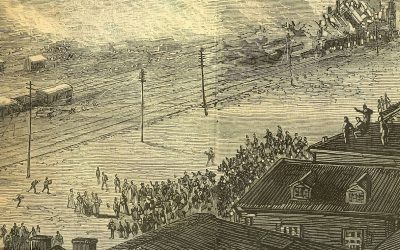Severe, prolonged shortages of various items and services persist amid the forced, virus-phobic Lockdown.[1] Part of the problem is the disrupting and rupturing of delicate supply chains due to the vast array of political edicts compelling business closures and the equivalent of a nationwide house arrest. But the shortages are due mainly to the “anti-price gouging laws” on the books of three-fourths of American states. These laws are unjust. They violate rights. They’re also harmful and deadly, depriving people of what they most need in a crisis.[2] The laws should be repealed.
The injustice of anti-gouging laws reflects the simple fact that people have a right to the property they earn and own, which includes the right to use it or save it or trade it or gift it in any way they voluntarily please. This principle is inviolable (as are all principles). There can be no “right” to violate this right and compel the property owner, merely because someone intensely needs another’s product. If we’re to be moral we mustn’t be moochers or looters but traders; we must pay for what we want, voluntarily. No property owner becomes a servant of the needy in emergency times–not a slave, not the property of the needy; the owner has rights deserving protection. Just as a woman facing an anti-abortionist mob rightly declares “my body, my choice,” so she rightly declares, when facing foes in commerce, “my property, my choice.”
In economic terminology, it’s important not to confuse the concept of shortage with the concept of scarcity. In the latter case, goods and services are said to possess value due partly to being scarce. Here “scarce” is merely a way of describing something as being in finite supply; that’s a truism, since there’s no “infinite” supply of anything. The only question is whether something exists in greater or lesser supply, whether abundant or rare. In contrast, the concept of “shortage” pertains only to cases when something is in small supply or out of supply because price changes have been legally obstructed. If prices aren’t allowed to adjust, a shortage can arise not only with rare things (like gold) but also with abundant things (like toilet paper).
Anti-price gouging laws are not only unjust, but to the extent they cause shortages in emergencies they also deprive people of things they need badly and would be willing to pay more for. If they don’t need the thing badly and can postpone its purchase to a post-crisis period they shouldn’t care (or complain) if a price is temporarily high. It’s certainly not the fault of the owners of suddenly and intensely-demanded goods and services that such values become more demanded in an emergency. The supplier didn’t cause the emergency, be it due to a hurricane, flood, war, earthquake, or terrorist attack. To pejoratively label the supplier a “gouger,” and fine or jail him, as if he’s the one inflicting harm or initiating force, is patently unjust; its akin to assaulting a messenger for delivering bad news. If anything, would-be buyers should be grateful for the would-be suppliers best positioned to provide much-needed things in crises.
Obviously, the prices of certain things can rise a lot in brief periods because supply has been destroyed or because quantity demanded skyrockets amid a steady supply. Regardless, big price increases reflect the facts of reality, not the whims of would-be sellers of suddenly more-valuable things. “Anti-gouging” laws–which typically criminalize the act of sellers posting “materially” higher prices after some politician declares “a “state of emergency”– surely don’t change reality, or the “facts on the ground.” These laws don’t end a shortage but cause it; they ensure that it persists and worsens, because the more that people see it occur and spread, they more they worry that they too may not get an item; panic makes them demand far more of the item, near term, than they would otherwise demand, which increases the shortage’s depth and duration.
If prices are free to rise, fall, and adjust in emergencies, as they do in normal times, neither shortages nor surpluses arise. Thus, economists say free markets “clear” at an “equilibrium” price – that which equalizes the quantities supplied and quantities demanded. If some price rises a lot in a crisis, would-be buyers learn that it’s only worth purchasing the thing if it’s urgently needed and can be put to a high and best use; if not, buyers buy less, defer purchases, or conserve. Absent unjust gouging laws, valuable things are not bought cheap, nor hoarded, nor wasted in low and worst uses.
On the supply side, as prices of certain things skyrocket in an emergency, but costs rise less, would-be sellers learn that it is now super-profitable to make more, find more, and sell more of the more valuable thing. Greater supplies will also come pouring in from outside the crisis region, from other towns, counties, states, or foreign lands.
Just as the setters of higher prices in emergencies are unjustly denounced, fined, and jailed as “gougers,” the makers of greater, above-average profits in emergencies are unjustly denounced, fined, and jailed as “profiteers.” Economically, it should obvious that the two phenomena (higher prices, higher profits) are closely related. Temporarily higher prices make possible temporarily higher profits (and wider profit margins–if costs rise less than price). These acts should be welcomed and applauded morally; they advance the mutual interests of sellers and buyers alike. They also help alleviate and terminate the harms inflicted by the crisis. We witness sellers and buyers alike acting in their own rational self-interest–the essence of morality [3] –neither mooching nor looting. In the process no one harms or “takes advantage of” (exploits) others.
The importance of the temporary aspect of emergencies is worth considering, especially in debating “price gouging” or “profiteering.” Emergencies by their nature are brief, not long-lasting; a society in a perpetual state of emergency is hardly a society at all, or else it’s simply a socialist society (e.g., North Korea, Venezuela). But we all know it is socialist premises, not capitalist premises, that fuel the animus against suppliers (businesses, capitalists). Prices can skyrocket in emergencies, of course, but precisely because emergencies are temporary, they will terminate quickly only if prices are left free to adjust, meaning that suppliers are left free to offer and create more supply while buyers are induced to curb their demand and conserve. It is rarely so impossibly difficult for anyone on the demand side of the equation to do this, knowing it’s a temporary condition. The “solution” is not price controls, which operate to convert temporary, manageable problems into permanent, catastrophic ones.
Notice that no one complains if an emergency leads to a sharp plunge in the price of some product, as happened recently with the price of oil. Is this a case of consumers “gouging” suppliers, depriving them of profit, perhaps even inflicting losses, by paying an abnormally low price? No one ever says so, but the “price gouging” slur is no less stupid or vile. The difference is the deep-seated, anti-capitalist bias that exists toward business (supply-side), as against the tender concern for the consumer (demand side). No one cares to admit that there are no consumers unless there are first producers.
Yet just as “price gouging” is nothing but an innocuous policy of surge pricing during an emergency, so “profiteering” is nothing but an innocuous policy of surge profiting during an emergency. Each deserve our commendation, not condemnation. Until and unless they can operate to the fullest and freest extent possible, the harm from emergencies will only persist and deepen. If the shortages are not cured by the hasty removal of price caps (especially in the crisis moment, but ideally in normal times, before the next crisis arrives), governments typically impose destructive schemes of rationing, which only add political favoritism, corruption, and peculation to the mix.
The denunciation of “profiteers” counts heavily on another latent bias, resulting from the long (Marxist-socialist) tradition of declaring that any profit, whether small, moderate, or large, whether temporary or persistent, is a “theft” committed by the big, bad “exploitative” capitalist (business owner), whether by underpaying workers (per classical economists) or over-charging customers (per neo-classical economists).
In fact, as Jean-Baptiste Say[4] and Joseph Schumpeter[5] explained, profits are earned by capitalists and entrepreneurs, as remuneration for the brains, ingenuity, skill, capital, risk-taking, and prescience they contribute to productive enterprise. Lesser laborers don’t contribute like that. The capitalist-entrepreneur is no less deserving in emergencies; indeed, the dangers, complexities, and deprivations so typical of crises are best met by those who are the most ingenious, incentivized, and resourceful.
There are few more important jobs in emergencies than those of price gougers and profiteers. Their foes, the edict issuers and price controllers, try to exploit all sides in troubled times and thereby treble the trouble. They pose as compassionate public servants committed to preserving “fairness,” preventing “exploitation,” or “protecting consumers.” Nonsense. A price kept so low that the thing cannot be had is equivalent to making the price infinite; now that is real “gouging,” inflicted solely by the saintly price controllers. They solve nothing; they multiply the chaos; they destroy. Some of them may even want crises to persist and deepen if their own power might do so too.
________
References:
[1] Richard M. Salsman, “Unwealthy is Unhealthy, so Why Mandate It?” American Institute for Economic Research, April 5, 2020.
[2] See Raymond C. Niles, “Anti-Gouging Laws Can Kill,” American Institute for Economic Research, March 3, 2020.
[3] See Ayn Rand, “The Objectivist Ethics,” in The Virtue of Selfishness: A New Concept of Egoism (New American Library, 1964).
[4] Jean-Baptiste Say, A Treatise on Political Economy (1803), especially Book II, Chapter VII, Section III (“Of the Profits of the Master Agent, or Adventurer, in Industry”) and Book II, Chapter VIII, Section II, “Of the Profits of Capital”).
[5] Joseph Schumpeter, The Theory of Economic Development (Transaction Publishers, 1934), especially Chapter IV (“Entrepreneurial Profit”) and Chapter V (“Interest on Capital”).




